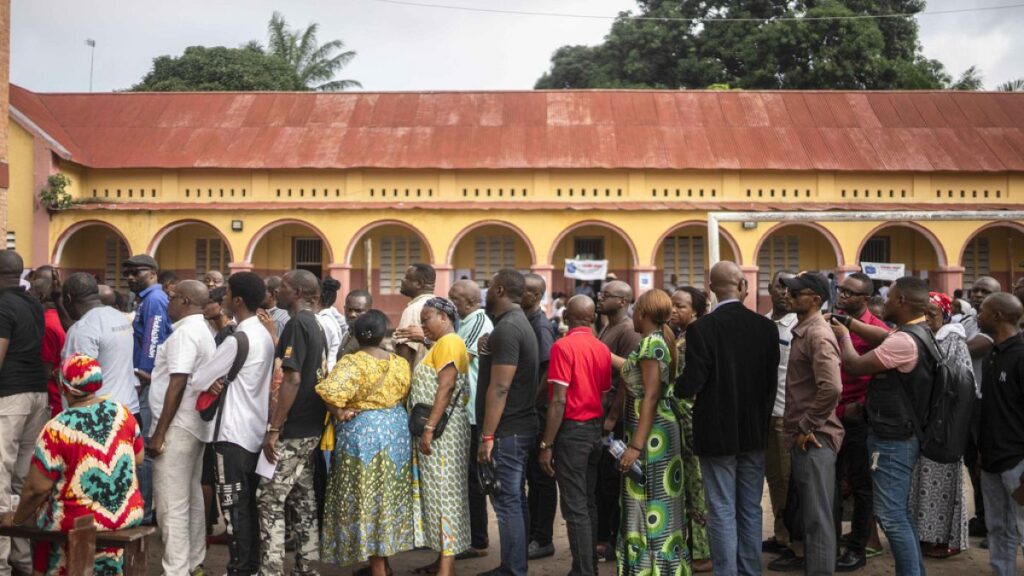In the Democratic Republic of Congo, nearly 44 million voters are expected at polling stations this Wednesday for high-risk general elections.
Morning enthusiasm but irritation in the queues: the Congolese of the DRC began to vote this Wednesday for high-risk general elections in which the outgoing president, Félix Tshisekedi, is running against a fragmented opposition.
A first voter placed his ballot in the ballot box at 6:09 a.m., only 9 minutes after the scheduled time, in an office in Kisangani, in the east of the country which, an hour ahead of the west , started to vote first.
But according to the findings of the AFP teams, the operations then began haphazardly in Goma, Bukavu, Beni, Lubumbashi and Tshikapa, with more or less significant delays, chaos and dysfunctions.
“It’s a great disappointment, there are terrible disorders in the organization”complains Jean Claude Nzine Cokola, a teacher, who arrived early at a polling station in South Kivu and was still waiting four hours later.
Voters were bracing for delays, common in the Democratic Republic of Congo and likely to be made worse by difficulties getting election materials to remote areas.
Nearly 44 million registered voters, out of a total of around 100 million inhabitants, are called upon to elect their president, but also their national and provincial deputies and, for the first time, their municipal councilors. Another first, Congolese from the diaspora must vote in five countries.
More than 100,000 candidates are in the running for the four elections. The president of the Electoral Commission (Céni), Denis Kadima, promised the “transparency” of the process, with “real-time” monitoring of the compilation of results.
“A change” ?
Several election observation missions are deployed.
With 25,000 people, that of the Catholic and Protestant churches is the largest and its opinions and conclusions are traditionally closely followed. Its animators promised a “parallel counting” for the presidential election.
In this single-round election, Félix Tshisekedi, 60, in power since early 2019, is candidate for a second term against 18 other applicants. His record is mixed, which he acknowledges, but he asks for five more years to “consolidate acquired knowledge”.
Throughout the campaign, he also vilified the supposed “candidates from abroad”, by suggesting that they were not “patriotic” enough in the face of the “attacks” of which he accuses in particular the Rwandan neighbor.
His main challenger, Moïse Katumbi, 58, a wealthy businessman and former governor of the mining province of Katanga (southeast), was particularly targeted by his attacks.
The pre-election period was poisoned by the security situation in the eastwhere the armed violence underway since the mid-1990s has reached a peak in tension for two years, with the resurgence of the M23 rebellion supported by Kigali.
The fighting has calmed down for around ten days, but the rebels continue to occupy large swaths of territory in North Kivu, in which residents are deprived of the vote.
In the north of the same province, on the other hand, in Beni, voters were unable to vote in the presidential election in 2018 because of insecurity but can do so this time. Lucie Zawadi, a 42-year-old farmer, says she is very happy to have been able to “fulfill (one’s) duty”. “These elections will bring change”she hopes.
Other presidential candidates include Dr Denis Mukwege, 68 years old, Nobel Peace Prize winner for his action in favor of raped women and Martin Fayulu, 67 years old, first strong candidate to have voted, in the morning in Kinshasa.
Opponents suspect the regime of having prepared the long-standing fraud by placing its men at the head of the CENI or the Constitutional Court.
The UN and the European Union have expressed concern about “hate speech” and, like the United States, called for transparent and peaceful elections.

